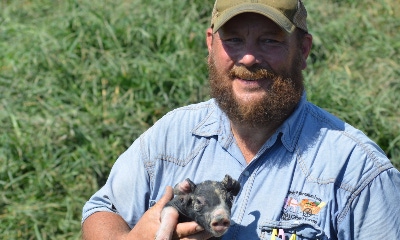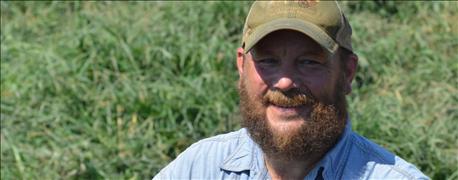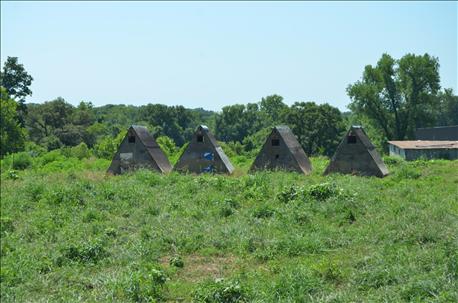
This is the first in a two-part series on Franklin County farmer Todd Geisert's pasture plate operation. It is a farm that includes pigs, produce and a grocery store. In this part, Missouri Ruralist looks at the pork and produce aspect of the farm that sits about an hour west of St. Louis.
With a sprawling grin tucked beneath his red mustache and beard, Todd Geisert crosses the farmyard. His pace quickens as he reaches the produce and pork roadside stand and immediately you can tell he is a man on a mission.

THE PIG GUY: Todd Geisert opens his farm to customers to see how he raises pigs.
The fifth generation farmer from Franklin County is eager to share how his farm produces pigs and produce. It is a journey that took him from following in his ancestors footsteps to charting his own course.
The pigs
The basics of Geisert's pork production have not changed in more than 100 years. He still raises hogs in the same manner as his ancestors--on pasture.
Despite the sweltering summer heat, sows emerge from A-frame huts and makeshift farrowing houses as they hear the tractor approaching. "We group them by age," Geisert explains. The older sows stay together in one pasture fenced off with solar-powered electric wire, while the young gilts that will farrow for the first time are in another pasture just over the hill.
Sows choose their own hut to give birth. "Just like people," Geisert says, "different ones need different things. Some don't need a lot to live; others need a big old house. Some let others into the house, and others keep it all to themselves. It depends on the sow."

RECYCLED LIFE: Sows farrow, or give birth to pigs, in A frame house in a pasture. The houses are made from recycled billboard signs.
As Geisert disappears into one of the 7-by-8-foot portable wooden hut made with recycled billboard signs he gets free from a local sign company, he emerges with a few baby pigs in hand. And his smile returns.
"These were born either yesterday or overnight," he explains. He will notch ears for identification, but that is it. There are no immunizations or antibiotics given to the piglets.
Geisert chose a base breed for his operation as Berkshire because of its taste and market demand. All of the pigs on the farm have are at least 1/2 to 3/4 Berkshire bloodlines with the remaining genetics including Duroc, Hampshire or Chesterwhite.
There are roughly 100 sows at the farm. During summer farrowing, Geisert achieves a six pig per litter average, but that number improves to 10 pigs in the winter when he relocates the sows and housing closer to the main barn. The pigs stay with their mommas until six weeks of age. Then they are relocated to the pasture feedlot.
Mud holes fill with finishing pigs. It is a way to keep cool in Missouri's summer heat. They will not only feed on pastures, but Geisert supplements their nutrition with grain. He will harvest these animals in six months when they reach the 250 to 300-pound range. He markets roughly 1,500 hogs each year.
The produce
Rotation is the key for this farm. Geisert is grazing pigs behind traditional crops like corn and soybeans as well as non-traditional crops such as pumpkins and tomatoes.
He harvests corn and soybean acres for feed. His produce he sells. And the produce portion of his business is booming.
The first year, Geisert planted 120 tomato plants. He sold the tomatoes produced by the plants at the roadside stand located on the farm. By noon, the tomatoes were gone and the honor-system collection box was full. The next year he planted 800 plants, then 2,500 plants both years the same problem. Last year, he planted 5,000 plants. "And we are still buying 2,000 to 3,0000 pounds of tomatoes a week just to fill our customer orders," he notes.
In addition to tomatoes, Geisert Family Farms produces peppers, zucchini, cucumbers and pumpkins. "Tomatoes and pumpkins are our money makers," he adds.
Since he took over the farm in 2008 Geisert found that if there is not a tomato at the roadside stand people will not stop. "If they stop for a tomato," he says, "they will buy other stuff."
Geisert finds that the production method of his ancestors still works today. "It is really quite simple," he notes. However, selling his products changed dramatically. It required an entrepreneurial mindset to open new doors in the marketplace.
Tomorrow-Geisert shares how he markets his pork and produce.
About the Author(s)
You May Also Like






